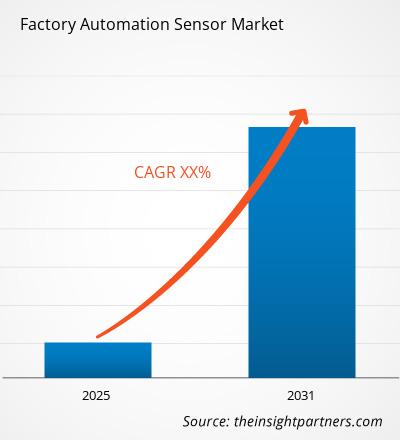MARKET INTRODUCTION
The demand in different end-user industries has accelerated significantly with the growing adoption of automation and ground-breaking technology enhancements. Through automation, the technological revolution in the factories has been encouraging the manufacturing industries to further invest in automation sensor to enhance their productivity and production cycle.
MARKET DYNAMICS
Rapid expansion in the manufacturing industry and the adoption of industrial automation in automotive industries are some of the factors driving the growth of the factory automation sensor market. Nevertheless, widening government support and integration of artificial intelligence is anticipated to provide ample growth opportunities to the players operating in the factory automation sensor market.
MARKET SCOPE
The "Global Factory Automation Sensor Market Analysis to 2031" is a specialized and in-depth study of the technology, media and telecommunication industry with a special focus on the global market trend analysis. The report aims to provide an overview of the factory automation sensor market with detailed market segmentation by type, end use industry, and geography. The global factory automation sensor market is expected to witness high growth during the forecast period. The report provides key statistics on the market status of the leading factory automation sensor market players and offers key trends and opportunities in the market.
MARKET SEGMENTATION
The global factory automation sensor market is segmented on the basis of type and end use industry. Based on type, the factory automation sensor market is segmented into temperature sensors, vibration sensors, vision sensors, pressure sensors, proximity sensors, humidity sensors, and others. Based on end use industry the factory automation sensor market is segmented into automotive, chemicals, energy and power, food and beverages, manufacturing, oil and gas, pharmaceuticals, and others.
REGIONAL FRAMEWORK
The report provides a detailed overview of the industry including both qualitative and quantitative information. It provides an overview and forecast of the global factory automation sensor market based on various segments. It also provides market size and forecast estimates from the year 2021 to 2031 with respect to five major regions, namely; North America, Europe, Asia-Pacific (APAC), Middle East and Africa (MEA) and South & Central America. The factory automation sensor market by each region is later sub-segmented by respective countries and segments. The report covers the analysis and forecast of 18 countries globally along with the current trend and opportunities prevailing in the region.
The report analyzes factors affecting the factory automation sensor market from both demand and supply side and further evaluates market dynamics affecting the market during the forecast period i.e., drivers, restraints, opportunities, and future trend. The report also provides exhaustive PEST analysis for all five regions namely; North America, Europe, APAC, MEA, and South & Central America after evaluating political, economic, social and technological factors affecting the factory automation sensor in these regions.
MARKET PLAYERS
The reports cover key developments in the factory automation sensor market as organic and inorganic growth strategies. Various companies are focusing on organic growth strategies such as product launches, product approvals and others such as patents and events. Inorganic growth strategies activities witnessed in the market were acquisitions, and partnership & collaborations. These activities have paved way for the expansion of business and customer base of market players. The market players from factory automation sensor market are anticipated to lucrative growth opportunities in the future with the rising demand for factory automation sensor in the global market. Below mentioned is the list of few companies engaged in the factory automation sensor market.
The report also includes the profiles of key companies along with their SWOT analysis and market strategies in the factory automation sensor market. In addition, the report focuses on leading industry players with information such as company profiles, components, and services offered, financial information of the last 3 years, the key development in the past five years.
- ABB Ltd.
- Analog Device Inc
- Amphenol Corporation
- Honeywell International Inc.
- NXP Semiconductor NV
- Rockwell Automation
- STMicroelectronics N.V
- Siemens AG
- Texas Instruments
- Vishay Intertechnology, Inc.
The Insight Partner's dedicated research and analysis team consist of experienced professionals with advanced statistical expertise and offer various customization options in the existing study.
Factory Automation Sensor Report Scope
| Report Attribute | Details |
|---|---|
| Market size in 2023 | US$ XX Million |
| Market Size by 2031 | US$ XX Million |
| Global CAGR (2023 - 2031) | XX% |
| Historical Data | 2021-2022 |
| Forecast period | 2024-2031 |
| Segments Covered |
By Type
|
| Regions and Countries Covered | North America
|
| Market leaders and key company profiles |
- Historical Analysis (2 Years), Base Year, Forecast (7 Years) with CAGR
- PEST and SWOT Analysis
- Market Size Value / Volume - Global, Regional, Country
- Industry and Competitive Landscape
- Excel Dataset

Report Coverage
Revenue forecast, Company Analysis, Industry landscape, Growth factors, and Trends

Segment Covered
This text is related
to segments covered.

Regional Scope
North America, Europe, Asia Pacific, Middle East & Africa, South & Central America

Country Scope
This text is related
to country scope.
Trends and growth analysis reports related to Electronics and Semiconductor : READ MORE..
The List of Companies
1. ABB Ltd.
2. Analog Device Inc
3. Amphenol Corporation
4. Honeywell International Inc.
5. NXP Semiconductor NV
6. Rockwell Automation
7. STMicroelectronics
8. Siemens AG
9. Texas Instruments
10. Vishay Intertechnology, Inc.
1. ABB Ltd.
2. Analog Device Inc
3. Amphenol Corporation
4. Honeywell International Inc.
5. NXP Semiconductor NV
6. Rockwell Automation
7. STMicroelectronics
8. Siemens AG
9. Texas Instruments
10. Vishay Intertechnology, Inc.



 Get Free Sample For
Get Free Sample For